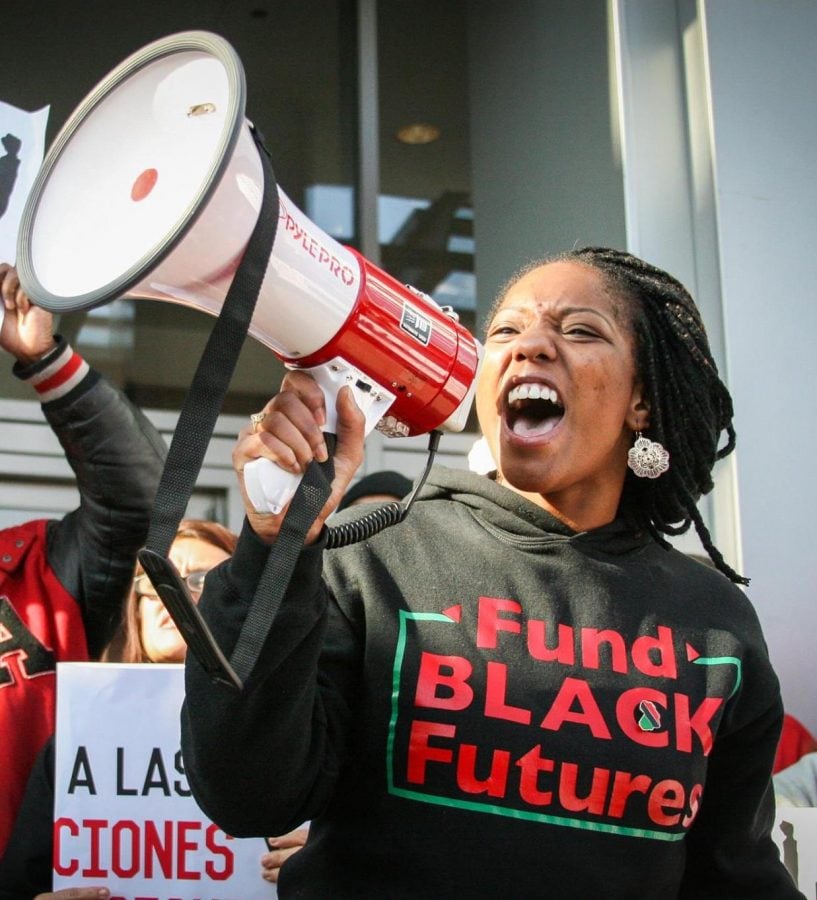Q&A: NU alumna Ashley O’Shay talks her documentary “Unapologetic”
A still from “Unapologetic” of Janae at a protest. The documentary followed Janae and Bella’s journeys as activists over four years.
February 25, 2021
After graduating from Northwestern, Ashley O’Shay (Communication ’15) knew she wanted to make impactful films. In her directorial debut “Unapologetic,” she followed two women, Janae and Bella, over the course of four years, documenting their journey in the fight for Black lives. Since then, the film has been featured in multiple film festivals, including the American Black Film Festival. The Daily sat down with O’Shay to talk directing, personal challenges and the effect the film has had on her and on the Black community.
This interview has been condensed and edited for clarity.
The Daily: What inspired you to make “Unapologetic”?
O’Shay: I wanted to provide a platform for a young, Black feminist voice. Around the time I started, there was this rise in social media channels about this police killing of a young Black woman, Rekia Boyd, and the police officer responsible skirted any kind of accountability via judicial systems. I was becoming really familiar with the case and started attending Chicago Police Board hearings. One meeting in particular, where the organizers shut the meeting down, the voices being centered in the (hearing) were people I could directly identify with as a young Black woman, which was something I’d never seen in my formal education, so I wanted to explore that. I grew up around a lot of Black women and I knew their power.
The Daily: Was there a moment for you where it really hit you that you were doing something important?
O’Shay: When I was originally filming with Janae, I did not know where this would go. The tape of the killing of Laquan McDonald came out and I remember going downtown to document this unforgettable moment in Chicago’s history. In that moment, I realized this would go down in history books just because of the scale of the corruption, so I continued to connect with other leaders and began to recognize it warranted a longer film.
The Daily: What were some challenges you faced as you were filming?
O’Shay: A big challenge was getting access to movement spaces because the organizers are very protective of the space and members. It took a lot of time to build trust with both Janae and Bella and the larger community, and once we established that rappor, things started to clear up a bit for us. We wanted the community to feel we were being ethical and representing them responsibly. It’s a tall task to ask someone to be on that side of the camera for that long, so we understood the gravity the situation could have.
The Daily: Since its release, what kind of impact has the film had?
O’Shay: We premiered in August 2020, and it felt like the timing aligned in a way because it was a perfect time to remind people of the work that young Black people in Chicago have been doing already, as early as 2012 to now. It puts people in a good position to have these conversations about abolishing the police and reallocating funds to the community. It’s great to be able to have answers to questions people may have about the movement. We are hoping to continue to partner with community organizations and activist groups to get this film in the hands of organizers and allow them to have it as a tool to bring more people into the movement.
Email: rebeccaaizin2023@u.northwestern.edu
Twitter: @rebecca_aizin
Related Stories:
— NU alumna Jenny Shi reflects on the year of her award-winning documentary “Finding Yingying”
— Chicago film and television industry embraces COVID-19 reality


